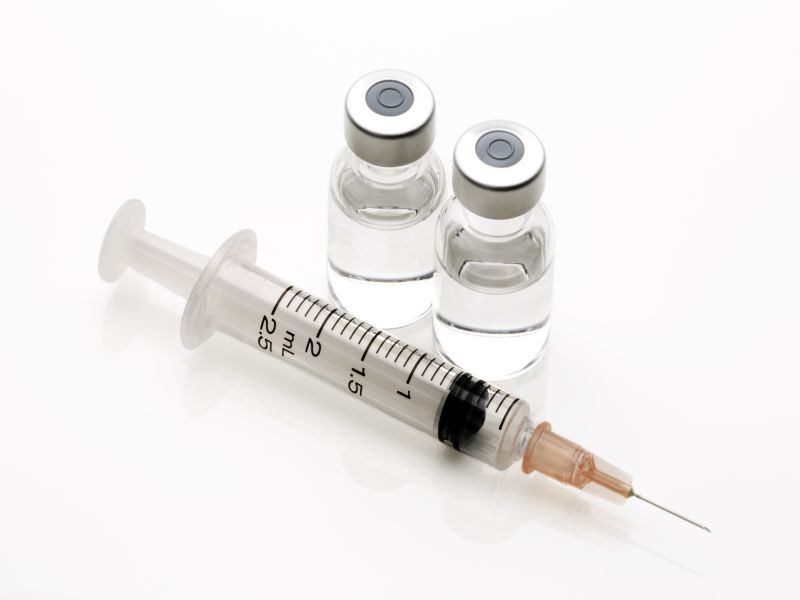
MONDAY, July 24, 2017 -- Getting a shot of medication to control HIV every month or two instead of having to take pills every day could transform the way the virus is kept at bay.
New research suggests that injectable, long-acting antiretroviral therapy for HIV is as safe and effective as oral medications. The injection -- given every four or eight weeks -- includes the drugs cabotegravir and rilpivirine.
"We have made considerable advances in the treatment of HIV over the last several decades," said study lead author Dr. David Margolis. "But for many patients living with HIV, it still remains a challenge to take daily oral medication, either because they are unable to or they choose not to. So it is important to find alternatives."
Related
Margolis is medical director of ViiV Healthcare in Research Triangle Park, N.C., the developer of this new approach and the company that funded the trial.
Nearly 37 million people around the world are living with HIV. Advances in treatment have led to improved survival and quality of life. Current treatment, however, requires taking medications every day throughout life. Poor compliance can result in treatment failure or drug-resistant mutations of the virus. Long-acting, injectable drugs might be a more convenient way of managing HIV, the researchers said.
"This is the first study to use injections to treat HIV, and gives us a picture of the long-term durability of the treatment," Margolis said.
The report was published online July 24 in the journal The Lancet, to coincide with presentation of the results of the trial at the International AIDS Society meeting in Paris, France.
Dr. Mark Boyd is chair of medicine at Lyell McEwin Hospital at the University of Adelaide in Australia. He said, "This study shows us that we now have a new tool for managing HIV."
The more options available means that HIV management can be adapted to the specific requirements of each patient, he said.
"Whether this new injectable option will become a widespread popular form of HIV management or will cater to more of a niche market only time can tell," said Boyd, who co-authored an accompanying journal editorial.
The current study was a phase 2 trial. These trials are designed to show that a treatment is safe and effective. If a phase 2 trial is successful, then phase 3 trials are done to show that the treatment is effective in a large group of patients.
In the first 20 weeks of this trial, Margolis and his colleagues gave 309 patients with HIV -- who had never been on antiretroviral therapy -- daily oral doses of the antiretroviral drugs cabotegravir and abacavir-lamivudine.
This first step served to suppress the virus and test how well patients tolerated the drugs before moving on to injections.
In all, 286 patients were included in the balance of the study. The patients were randomly assigned to injections of cabotegravir plus rilpivirine every four or eight weeks, or to daily oral drugs.
After 32 weeks, HIV remained suppressed in 91 percent of those taking the drugs orally, in 94 percent of those receiving monthly injections and in 95 percent of patients receiving injections every two months, the researchers found.
At 96 weeks, viral suppression was maintained in 84 percent of patients taking oral medication, 87 percent of those receiving monthly injections and in 94 percent of those receiving injections every other month.
The most common side effects were pain at the site of the injection. Most reactions were mild or moderate and lasted an average of three days. Other side effects included symptoms of a common cold, diarrhea and headache, which were similar in all three groups.
Margolis said phase 3 trials are under way to test the effects of monthly injections in a larger number of patients. Based on these findings, the investigators will apply for approval from the U.S. Food and Drug Administration. Margolis hopes the injection therapy will be available in 2019.
Rowena Johnston, vice president and director of research at amfAR -- The Foundation for AIDS Research, said, "Anything that improves adherence, and therefore the treatment outcomes, of people living with HIV is totally a welcome advance."
Johnston thinks, however, that additional trials are needed to determine who would benefit most from this approach. Specifically, "Who are the people who want to use this kind of treatment?" she said.
This trial was done in the United States and Europe, Johnston pointed out, but since most people with HIV live in Africa and Asia, it would be important to see the acceptance of this treatment in those populations.
"Which patient would prefer an injection to an oral medication remains an open question," she said.
"The more options we have, the more people we can treat better, and that is the ultimate goal of HIV treatment. Different strokes for different folks," Johnston added.
More information
For more on HIV/AIDS, visit the U.S. Centers for Disease Control and Prevention.
Copyright © 2017 HealthDay. All rights reserved.














